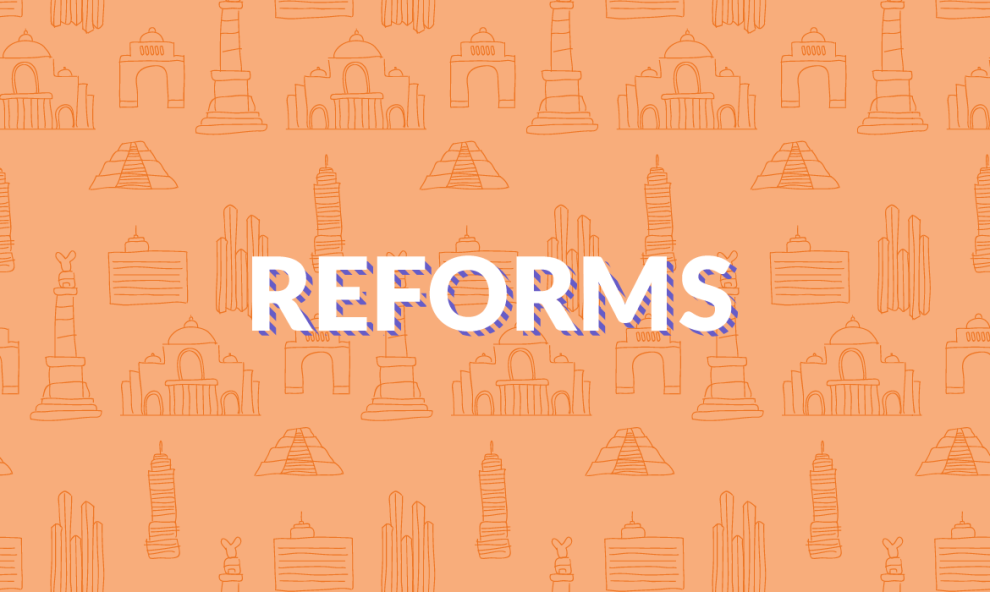The country is going through difficult times, which does not cease to be paradoxical to many. For the PRIists, who feel that they’ve “made it”, everything seemed to be moving forward without a hitch. For the general population, who just wants to live in peace, the sense of order that the new government has brought seemed to offer the opportunity to make that desire true. However, the only thing that is clear is that the real problems, those at the core, have not changed and, if anything, have intensified. Thinking about this, I recalled the famous phrase of Paul Valery that “The trouble with our times is that the future is not what it used to be.”
Part of the problem Mexico faces has to do with the fact that the discussion is marred by explanations, proposals, desires and interests, all legitimate, but that end up distorting rather than clarifying the picture. What follows is the way I understand and see the moment that Mexico is going through and how it got there.
The old system stabilized the country after the revolutionary epic, but ended up being unsustainable. It worked well for a while (especially between 1950 and 1970), but collapsed in part due to its own contradictions and partly by its success in creating an urban middle class that rebelled against “the system”.
Echeverria’s response was to inflate the economy to make room for all claimants, which created a caste of entitled beneficiaries (unions, business groups, peasants and politicians) who continue plundering and subtracting productivity from the economy as a whole. He also unleashed an era of economic crises and social conflict.
The reforms of the 80s and 90s sought to build a new platform for economic growth and laid the foundations of prosperity that the modern industrial sector enjoys today. Unfortunately, the folly of protecting entrenched PRI interests deepened and reinforced the contradictions that are obvious to all: protected sectors, lack of competition, powerful monopolies and, in general, very low productivity growth in the economy.
Despite this, prosperity has been real and has made it possible for the country’s politics to evolve toward democratic competition. Electoral reforms led to the defeat of the PRI in 2000 and to the alternation of parties in government. As in the economy, a reluctance to build modern institutions led to the contradictions that characterize today’s political life, above all the proliferation of conflicts for which the old institutions are inadequate. They cannot respond to the new issues or channel conflicts and pacify the country. They were created for a different era and not to foster citizen participation or to solve problems.
Mexico is an extraordinarily complex country that is very difficult to govern. The ethnic, religious, geographic, cultural and economic diversity and dispersion and the contrasts among regions require exceptional political skills. Historically, the system worked when there was a functioning central government in conjunction with skilled and effective local governments. As Dudley Ankerson argues, the PRI ruled for decades with methods that today are perceived as intolerable but that had the effect of making it appear easier than it actually was. The PAN governments believed that it was just a matter of removing the PRI. Today Oaxaca, Guerrero and Michoacán put in evidence how the old PRI methods are no longer viable. The same goes for PAN’s naiveté.
The crises, errors, corruption and incompetence of the country’s rulers discredited the political class. The arrogance of politicians (and their relatives) and their parasitism, the abuse by officials, the persistence of the excesses engaged in by labor leaders (which may change but which always remain the same) and the mockery that the government has made of the transparency mechanisms, all but justify and deepen the cynicism and mistrust characteristic of the Mexican.
These realities make it indispensable to carry out a real political reform. The Pact that the current government has devised is better than the paralysis of the past decades but is a poor substitute for a system of effective government (executive-legislative).
Beyond its specific traits, a political reform would have to achieve the following: a) politicians must be accountable to the electorate and not to their bosses; b) mechanisms to allow the formation of legislative majorities, c) a system of effective governance, both to make it possible for the government to actually govern, as well to resolve the looming security crisis. There is no one way to achieve these goals: the important thing is to achieve them. Some prefer a second electoral round, others a semi-parliamentarian system; some will want re-election, others a strong executive power; some prefer proportional representation, others a direct system. What matters is not the form but the result and the flexibility to correct the system until it works.
While politicians fight among themselves, opposition parties agonize and the government pretends to reform, the lives of the citizenry are increasingly beset by organized crime: extortion and kidnapping have become daily events in much of the country. The issue is not whether the previous government had the right strategy or the wrong one, or whether the current one can solve the problem without defining a different strategy. The issue is that organized crime is eroding the fabric of society and, if not addressed, will end up destroying it. It has happened elsewhere.
Therefore, it is urgent to launch a real reform of the justice system, of the office of the prosecutors, the police and, in general, of the entire security system. Mexico’s problem is not drug trafficking as such, but State capacity: the lack of basic law and order, law enforcement and justice for maintaining peace, security and justice. Rule of law. In a word, Mexico needs to become a modern country.
In addition to the above, it is imperative to transcend the notion that a few constitutional reforms will transform the country. What will transform it is the actual implementation of reforms on issues such as education, labor and social security, all of which entail the undermining of powerful interests of all kinds. The same is true of the energy sector and the tax and spending system and their supervision. It is there, not in legislative awards ceremonies, where the government’s success will be measured. At the end of the day, what counts is productivity growth: all the rest is mere rhetoric.
The current government has a clear sense of government and power, including extraordinary communications skills. However, it is essential to advance these characteristics and skills but they are not sufficient in themselves for achieving the government’s mission. The country requires a new and modern institutional system, which is a clear break with the past, which keeps dragging it down and hindering its potential. Without that, not even the most competent government politically could be successful.





Comments